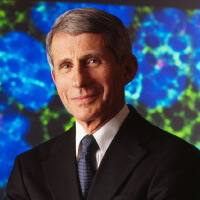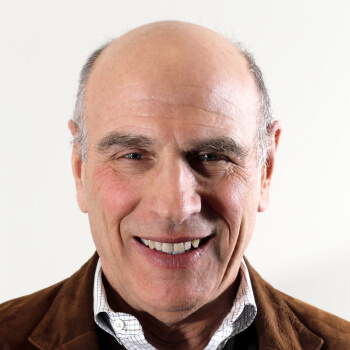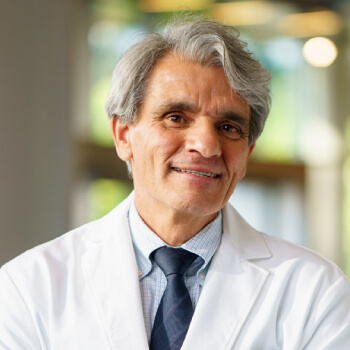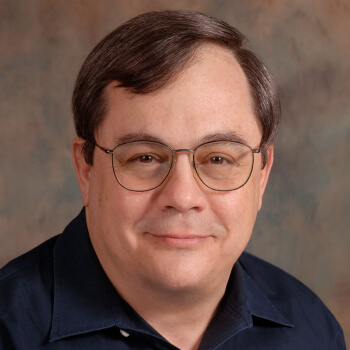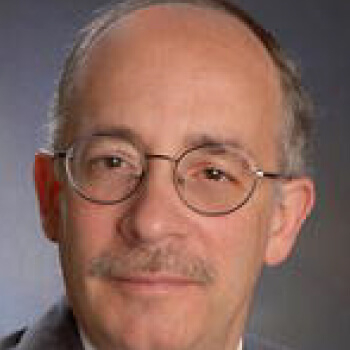Editorial Board
Meet the editors of Harrison’s - World leaders in clinical, academic, and research medicine.
Contributors
Pages
Dr. J. Larry Jameson is the Robert G. Dunlop Professor of Medicine and Dean of the Perelman School of Medicine at the University of Pennsylvania. He received his medical degree from the University of North Carolina and performed clinical training in internal medicine and endocrinology at Massachusetts General Hospital where he served as Chief of the Thyroid Unit.
Prior to assuming leadership at the University of Pennsylvania in 2011, Dr. Jameson served in several leadership roles at Northwestern University’s Feinberg School of Medicine, including Chief of the Division of Endocrinology, Chair of the Department of Medicine, and Dean of the School of Medicine.
A prolific researcher and writer, Dr. Jameson’s research has focused on the genetic basis of hormonal disorders. He has authored more than 300 scientific articles. He is an editor of Harrison’s Principles of Internal Medicine, the most widely used medical text worldwide, and co-editor of Jameson and DeGroot’s Endocrinology, now in its 7th edition. As a visiting lecturer, he has been invited to present at leading institutions around the world.
Dr. Jameson has received several distinguished awards including the Van Meter Award from the American Thyroid Association, the Ernst Oppenheimer Award from the Endocrine Society, the Sheen Award from the American College of Surgeons, the Outstanding Science Award from the American College of Physicians, and the Fred Conrad Koch Award, the highest honor of the Endocrine Society.
Among a number of professional distinctions and honors, Dr. Jameson served as President of the Endocrine Society and has been elected to the American Society for Clinical Investigation, the Association of American Physicians, the American Academy of Arts and Sciences, and the Institute of Medicine, established by the National Academy of Sciences to honor professional achievement in the health sciences. He has served as a member of the medical advisory board of the Howard Hughes Medical Institute and as a director of the American Board of Internal Medicine.
Dr. Anthony S. Fauci, is director of the National Institute of Allergy and Infectious Diseases (NIAID) at the US National Institutes of Health, where he oversees an extensive research portfolio devoted to preventing, diagnosing, and treating infectious and immune-mediated diseases.
Dr. Fauci also serves as a key advisor to the White House and Department of Health and Human Services on global AIDS issues and on initiatives to bolster medical and public health preparedness against emerging infectious disease threats such as pandemic influenza. He was one of the principal architects of the President’s Emergency Plan for AIDS Relief, which has helped save millions of lives throughout the developing world.
Dr. Fauci also is the longtime chief of the NIAID Laboratory of Immunoregulation. He has made many contributions to basic and clinical research on the pathogenesis and treatment of immune-mediated and infectious diseases. He helped pioneer the field of human immunoregulation by making important basic scientific observations that underpin the current understanding of the regulation of the human immune response. In addition, Dr. Fauci is widely recognized for delineating the precise mechanisms whereby immunosuppressive agents modulate the human immune response. He developed effective therapies for formerly fatal inflammatory and immune-mediated diseases such as polyarteritis nodosa, granulomatosis with polyangiitis (formerly Wegener’s granulomatosis), and lymphomatoid granulomatosis.
Dr. Fauci has made seminal contributions to the understanding of how the human immunodeficiency virus (HIV) destroys the body’s defenses leading to its susceptibility to deadly infections. Further, he has been instrumental in developing highly effective strategies for the therapy of patients living with HIV/AIDS, as well as for a vaccine to prevent HIV infection. He continues to devote much of his research time to identifying the nature of the immunopathogenic mechanisms of HIV infection and the scope of the body’s immune responses to HIV.
Dr. Fauci is a member of the US National Academy of Sciences and is the recipient of numerous prestigious awards for his scientific and global health accomplishments, including the National Medal of Science, the Robert Koch Medal, the Mary Woodard Lasker Award for Public Service, and the Presidential Medal of Freedom. He has been awarded 38 honorary doctoral degrees and is the author, coauthor, or editor of more than 1,200 scientific publications, including several major textbooks.
For more than four decades, Dr. Dennis L. Kasper has conducted research in microbiology, infectious diseases, immunology, and public health while discharging a broad range of administrative and educational responsibilities. He is the William Ellery Channing Professor of Medicine and a Professor of Microbiology and Molecular Genetics at Harvard Medical School.
Dr. Kasper elucidated the structures and pathogenic roles of all nine capsular polysaccharides and important surface proteins of group B Streptococcus, deriving a highly immunogenic glycoconjugate vaccine that is now in clinical trials. Subsequently, he delineated the microbiota’s centrality in immune system development, maturation, and regulation, thus initiating a new and extremely active field of research. He defined the role of bacteria and bacterial molecules from the host-specific microbiota in immunologic development and in the pathogenesis of autoimmune and infectious diseases; in addition, he defined the therapeutic potential of these microorganisms and molecules. Integrating microbiology and immunology to study the intestinal mutualist Bacteroides fragilis, Dr. Kasper identified genetic loci for eight polysaccharides; among these, he discovered that polysaccharide A (PSA) is essential for systemic/mucosal immune maturation. He demonstrated that PSA stimulates innate (Toll-like receptor 2) and adaptive immunity and is sufficient for restoring TH1/TH2 balance in normally TH2-skewed germ-free mice. Dr. Kasper also showed that dendritic cell–presented PSA elicits the production of interleukin 10 by regulatory T cells and can prevent and treat experimental Crohn’s disease. He defined the microbiota’s role in the early establishment of invariant natural killer T cell numbers in colon and lung and identified another immunomodulatory microbial molecule, glycosphingolipid Bf717, which confers lifelong resistance to experimental ulcerative colitis through immunoregulation of proinflammatory iNKT cell homeostasis.
Dr. Kasper has served as Chair of the National Institute of Allergy and Infectious Diseases’ Board of Scientific Counselors, as President of the International Society for Infectious Diseases, as Executive Dean for Academic Programs at Harvard Medical School, as Principal Investigator of the New England Regional Center of Excellence for Biodefense and Emerging Infectious Diseases, as PI of the Center of Excellence for Translational Research in Bacteriology at Harvard Medical School, and as Chair of the National Science Advisory Board on Biosecurity. He is also a member of the Institute of Medicine of the National Academy of Sciences.
For both the 16th and the 19th editions of Harrison’s Principles of Internal Medicine, Dr. Kasper has been the editor-in-chief as well as the editor of the infectious diseases section. He is the author of more than 450 research and clinical publications encompassing an array of topics in infectious diseases, immunology, and microbiology.
Dr. Stephen L. Hauser is Professor of Neurology, Director, UCSF Weill Institute for Neurosciences, University of California San Francisco.
Dr. Hauser is a fellow of the American Academy of Arts and Sciences and the American Academy of Physicians and is a member of the Institute of Medicine of the National Academy of Sciences (former Chair of the Committee on Gulf War and Health Outcomes and the Committee on Long-Term Effects of Blast Exposure). He has served as editor-in-chief of Annals of Neurology and is a former President of the American Neurological Association and President of the medical staff at UCSF. He also serves on several scientific advisory boards for nonprofit organizations.
Dr. Hauser has received numerous awards and honors for his work, including the Jacob Javits Neuroscience Investigator Award, the John Dystel Prize, and the Charcot Award for Multiple Sclerosis Research. In 2010 Dr. Hauser was appointed by President Obama to the Presidential Commission for the Study of Bioethical Issues, charged with advising the President on issues that may emerge from advances in biomedicine and related areas of science and technology.
He is a graduate of the Massachusetts Institute of Technology (Phi Beta Kappa) and Harvard Medical School (Magna Cum Laude). He trained in internal medicine at the New York Hospital–Cornell Medical Center, in neurology at the Massachusetts General Hospital, and in immunology at Harvard Medical School and the Institute Pasteur in Paris, France. He was a faculty member at Harvard Medical School before moving to UCSF.
Dr. Dan L. Longo earned his Bachelor of Arts degree from Washington University in St. Louis and his medical degree from the University of Missouri.
During medical school, he obtained a year of pathology training focused on hematology as a Post-Sophomore Fellow. He trained in internal medicine at the Peter Bent Brigham Hospital of Harvard Medical School. He obtained subspecialty training in oncology at the National Cancer Institute and postdoctoral laboratory training in the Laboratory of Immunology, National Institute of Allergy and Infectious Diseases.
After completing his training in 1980, he became a senior investigator in the Medicine Branch of the National Cancer Institute. In 1985, Dr. Longo was named the director of the Biological Response Modifiers Program of the National Cancer Institute. In 1995, he became scientific director of the National Institute on Aging. In 2010, he became deputy editor of the New England Journal of Medicine and senior physician at the Brigham and Women’s Hospital. He has published more than 880 papers and book chapters, is an associate editor of the Journal of the National Cancer Institute, and is on the editorial boards of several other journals. In addition to his work on Harrison’s Principles of Internal Medicine, he edits Cancer Chemotherapy and Biotherapy: Principles and Practice with Bruce Chabner.
He has elucidated mechanisms by which natural killer cells regulate hematopoiesis, tumors inhibit T-cell function, and activation signals induce neoplastic cell death. He has developed treatments that improve the survival of patients with lymphoma and Hodgkin’s disease and pioneered use of antibodies, cytokines, adoptive cellular therapies, and vaccines for cancer treatment.
He has been recognized by election to the American Society of Clinical Investigation and the Association of American Physicians and is among the top 1% of cited authors in life sciences. He received the Dr. Tovi Comet-Walerstein Science Award from Bar-Ilan University, Israel.
Dr. Joseph Loscalzo is Hersey Professor of the Theory and Practice of Medicine at Harvard Medical School, Chairman of the Department of Medicine, and Physician-in-Chief at Brigham and Women's Hospital. Dr. Loscalzo received his AB degree (summa cum laude), his PhD in biochemistry, and his MD from the University of Pennsylvania. His clinical training was completed at Brigham and Women's Hospital and Harvard Medical School, where he served as Resident and Chief Resident in medicine and Fellow in cardiovascular medicine.
After completing his training, Dr. Loscalzo joined the Harvard faculty and staff at Brigham and Women's Hospital in 1984. He rose to the rank of Associate Professor of Medicine, Chief of Cardiology at the West Roxbury Veterans Administration Medical Center, and Director of the Center for Research in Thrombolysis at Brigham and Women's Hospital. He joined the faculty of Boston University in 1994, first as Chief of Cardiology and, in 1997, Wade Professor and Chair of Medicine, Professor of Biochemistry, and Director of the Whitaker Cardiovascular Institute. He returned to Harvard and Brigham and Women's Hospital in 2005.
Dr. Loscalzo is recognized as an outstanding cardiovascular scientist and clinician. He has received many awards, including the Clinician-Scientist Award, the Distinguished Scientist Award, and the Research Achievement Award from the American Heart Association, the Research Career Development Award from the NIH, the George W. Thorn Award for Excellence in Teaching at Brigham and Women's Hospital, the William Silen Lifetime Achievement Award in Mentoring at Harvard Medical School, Educator of the Year Award in Clinical Medicine from Boston University, the Glaxo Cardiovascular Research Award, the Outstanding Investigator Prize from the International Society for Heart Research, and election to the American Society for Clinical Investigation, the Association of American Physicians, the American Association for the Advancement of Science, the American Academy of Arts and Sciences, and the Institute of Medicine of the National Academy of Sciences. He has served on several NIH study sections and editorial boards and has chaired the Gordon Conference on Thrombolysis. He served as an associate editor of the New England Journal of Medicine for 9 years, Chair of the Cardiovascular Board of the American Board of Internal Medicine, Chair of the Research Committee of the American Heart Association, Chair of the Scientific Board of the Stanley J. Sarnoff Society of Fellows for Research in the Cardiovascular Sciences, and Chair of the Board of Scientific Counselors of the National Heart, Lung, and Blood Institute of the National Institutes of Health, and a member of the Advisory Council of the National Heart, Lung, and Blood Institute of the National Institutes of Health. He is currently Editor-in-Chief of Circulation.
Dr. Loscalzo's research interests involve the vascular biology of endothelial cells and platelets and their role in atherosclerosis and thrombosis. In particular, his laboratory has focused much of its efforts in recent years on the biology and pathobiology of nitric oxide, reactive nitrogen species, and reactive oxygen species in the vasculature using molecular, genetic, biochemical, cellular, and animal approaches. He has also developed a growing interest in the application of network science and systems biology to human pathobiology and disease.
Dr. Loscalzo has been a visiting professor at many institutions and has authored or co-authored more than 700 scientific publications and authored or edited 39 books. He is also the recipient of many grants from the NIH and industry for his work in the areas of vascular biology, thrombosis, and atherosclerosis over the past 30 years.


